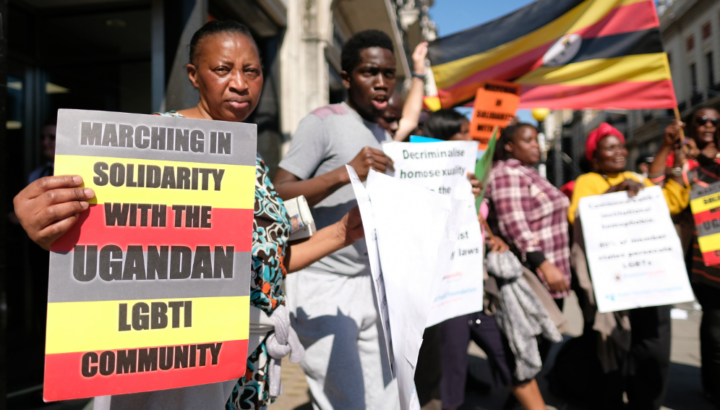Uganda’s parliament passed sweeping anti-homosexuality legislation that proposed tough new penalties for same-sex relationships. Copyright: Alisdare Hickson, (CC BY-NC-ND 2.0)
BY ESTHER NAKKAZI
Uganda’s anti-homosexuality bill, if signed into law, could lead to the withdrawal of foreign aid and threaten goals to end HIV/AIDS by 2030, advocates warn.
Uganda’s parliament passed the revised Anti-Homosexuality Act (AHA), which criminalises homosexual conduct, with minimal amendments this week (2 May).
The legislation was first passed at the end of March but revised in April after President Yoweri Museveni returned it to parliament for amendments.
“If it becomes law, it will increase stigma and discrimination against LGBTQ people and men who have sex with men, further limiting prevention and treatment services.” Richard Lusimbo, director-general, Uganda Key Populations Consortium
Advertisement
The bill includes a punishment of life imprisonment for same-sex sexual conduct and up to ten years behind bars for attempted same-sex sexual acts. It also imposes the death penalty for “aggravated homosexuality” and criminalises the “promotion” of homosexuality, which many people fear will encourage homophobia.
UNAIDS had warned that passing the bill into law would jeopardise progress in the fight against HIV/AIDS and undermine fundamental human rights including the right to health and the right to life.
“Uganda’s new Anti-Homosexuality bill is an outrage,” said Winnie Byanyima, executive director of UNAIDS.
Advertisement
“Access to timely and quality health care is a human right – sexual orientation should not determine one’s rights.”
Anne Githuku-Shongwe, director of the UNAIDS support team for eastern and southern Africa, said Uganda had made “excellent progress” in tackling the AIDS pandemic. “This new bill, if passed into law, would undercut that progress,” she warned.
Human rights ‘disaster’
According to a study published in The Lancet, HIV prevalence is significantly higher among men who have sex with men (MSM) and in African countries with laws that criminalise same sex relationships.
Advertisement
“If it becomes law, it will increase stigma and discrimination against LGBTQ [lesbian, gay, bisexual, transgender, and queer] people and men who have sex with men, further limiting prevention and treatment services,” said Richard Lusimbo, director-general of Uganda Key Populations Consortium, a human rights organisation.
Lusimbo explained that the bill, if passed into law, would be a disaster to the human rights of LGBTQ people, to public health and the fight against HIV/AIDS.
The US government has threatened to withdraw funding for Uganda through its President’s Emergency Plan For AIDS Relief (PEPFAR) if the law is passed.
“At this time, we are reviewing the possibility that the AHA, if signed, might prevent us from providing lifesaving prevention, care and treatment services equitably to all Ugandans receiving PEPFAR support,” said a US State Department spokesperson.
Advertisement
PEPFAR’s annual HIV/AIDS response investment in Uganda is about US$400 million.
Despite the pressure from the US and other governments, there is speculation that President Museveni will most likely sign the bill into law. However, the power of ascension of a bill does not lay primarily with the president.
Advertisement
The Ugandan parliament can also pass the bill into law if the president does not assent to or veto a bill after it is passed by parliament within 30 days or if the bill is returned to parliament twice.
In his speech on April 22, at conference themed ‘Protecting African culture and family values’, President Museveni thanked members of the Ugandan parliament for passing the bill.
Advertisement
“It is good that you rejected the pressure from the imperialists,” he said, reflecting his support for what has been described by activists and advocates as a draconian law.
The bill is setting the pace for other African nations as countries like Kenya, Tanzania, Ghana and others indicate readiness to introduce similar bills in solidarity with Uganda.
Advertisement
Charles Brown, executive director of Preventive Care International, a Ugandan non-governmental organisation that focuses on HIV, says the bill is harsh and not well thought through. He fears it will further entrench inaccessibility of health services for people in same sex relationships.
“Already, the landlady of one of my offices in western Uganda called me saying that she was told that our organisation promotes homosexuality and she is scared of being arrested,” Brown told SciDev.Net, fearing eviction.
“We hope that the president doesn’t sign it into law,” he added.
This piece was produced by SciDev.Net’s Sub-Saharan Africa English desk.
This article was originally published on SciDev.Net. Read the original article.
Add a comment






